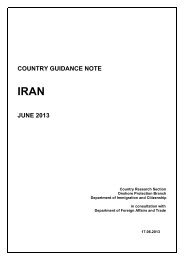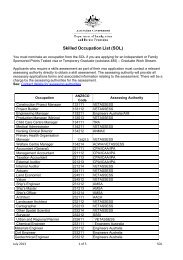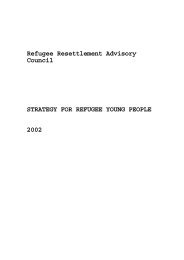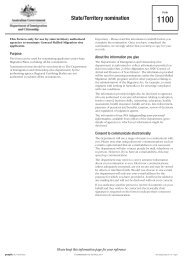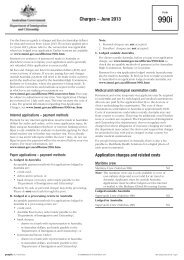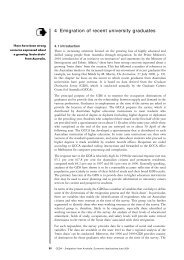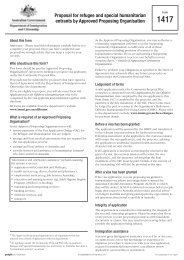Evaluation of the Integrated Humanitarian Settlement Strategy (IHSS)
Evaluation of the Integrated Humanitarian Settlement Strategy (IHSS)
Evaluation of the Integrated Humanitarian Settlement Strategy (IHSS)
You also want an ePaper? Increase the reach of your titles
YUMPU automatically turns print PDFs into web optimized ePapers that Google loves.
However factors such as agencies taking on tasks not included in <strong>the</strong>ir contracts and <strong>the</strong> existence <strong>of</strong><br />
gaps in service provision are likely to continue to create confusion about exactly what <strong>the</strong> o<strong>the</strong>r<br />
agencies do.<br />
While it is correct that explicit guidelines do exist as to what services service providers are expected<br />
to deliver, in practice this clarity is <strong>of</strong>ten lost. Clients, and <strong>the</strong>ir needs and problems, tend not to stay in<br />
neat boxes. For example, a woman’s need for child care services that would allow her to attend<br />
English classes might be fur<strong>the</strong>r caught up in issues relating to <strong>the</strong> state <strong>of</strong> her children’s health which<br />
can best be addressed through a General Practitioner (GP), <strong>the</strong> choice <strong>of</strong> which is contingent upon<br />
her having long-term accommodation. Moreover, clients certainly cannot be expected to know and<br />
understand <strong>the</strong> lines <strong>of</strong> responsibility <strong>of</strong> <strong>the</strong> various agencies and so are likely to present with a<br />
complex problem to any one (or all) service providers. For better or worse, service providers are<br />
reluctant to tell a client that <strong>the</strong> client’s presenting problem is ano<strong>the</strong>r agency’s responsibility. As a<br />
consequence, service delivery is <strong>of</strong>ten demand-driven by <strong>the</strong> clients, in which lines <strong>of</strong> responsibility<br />
and rationing <strong>of</strong> service become meaningless.<br />
Some service providers feel – correctly or not – <strong>the</strong> unit costing/payment system exacerbates this<br />
problem. Many, while still attempting to respond to clients’ needs, sometimes do so with a grudging<br />
reluctance – feeling that <strong>the</strong>y are having to pick up <strong>the</strong> pieces which are o<strong>the</strong>r service providers’<br />
responsibilities without adequate recompense. In part, some <strong>of</strong> <strong>the</strong>se issues may be addressed by<br />
<strong>the</strong> measures outlined in section 4.1. However to some extent this is a feature <strong>of</strong> shared<br />
responsibility in <strong>the</strong> provision <strong>of</strong> human services and may not be substantially different from problems<br />
which existed under grants funding.<br />
A fur<strong>the</strong>r factor identified as a barrier to coordination was <strong>the</strong> competitiveness <strong>of</strong> <strong>the</strong> tendering<br />
process, and this has resulted in some service providers being less than willing to work toge<strong>the</strong>r. For<br />
example, a few service providers expressed reluctance to make certain intellectual property that <strong>the</strong>y<br />
have developed (eg service protocols, evaluation processes and outcomes etc) available to o<strong>the</strong>r<br />
agencies – anticipating that <strong>the</strong>y may very well be tendering competitively with <strong>the</strong>se same agencies<br />
at some time in <strong>the</strong> future.<br />
Some <strong>of</strong> <strong>the</strong> consultations revealed that <strong>the</strong> experience <strong>of</strong> competitive tendering had, in a small<br />
number <strong>of</strong> instances, exacerbated existing tensions between particular agencies, especially where<br />
one agency disagreed with <strong>the</strong> awarding <strong>of</strong> a contract to ano<strong>the</strong>r agency. However, this was not a<br />
widespread finding. Some disgruntlement with <strong>the</strong> tendering process was heard during <strong>the</strong><br />
consultations, but this appeared to be general dissatisfaction with <strong>the</strong> change from a grants model to<br />
a competitive tendering model, and in most cases did not appear to have a significant bearing on <strong>the</strong><br />
way agencies worked toge<strong>the</strong>r.<br />
A lack <strong>of</strong> coordination between service providers results in clients not always receiving appropriate<br />
referrals, increased workloads for individual service providers and duplication <strong>of</strong> services. Too <strong>of</strong>ten,<br />
no one service provider has <strong>the</strong> ‘bigger picture’ <strong>of</strong> what is happening with <strong>the</strong>ir clients. Not<br />
surprisingly, integration was best where all or most service contracts were held by one agency,<br />
particularly where <strong>the</strong> agency also had responsibility for longer term settlement services. This was <strong>the</strong><br />
case in some <strong>of</strong> <strong>the</strong> smaller States/Territories and in some regional areas, where <strong>the</strong> entrant receives<br />
a ‘one stop’ service. Attempts have been made, in certain localities, to <strong>of</strong>fer an integrated service<br />
while still drawing on <strong>the</strong> specialised expertise or resources <strong>of</strong>fered by selected service providers.<br />
This has been done by <strong>the</strong> lead agency sub-contracting a specialist (eg <strong>of</strong>fering accommodation<br />
26<br />
<strong>Evaluation</strong> <strong>of</strong> <strong>the</strong> <strong>Integrated</strong> <strong>Humanitarian</strong> <strong>Settlement</strong> <strong>Strategy</strong> 27 May 2003



